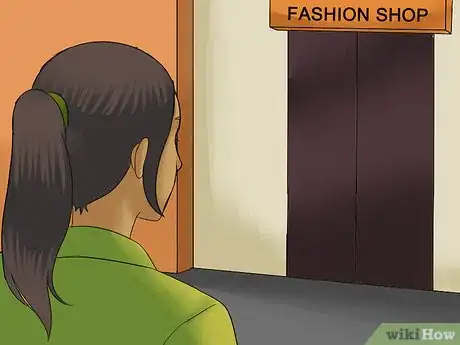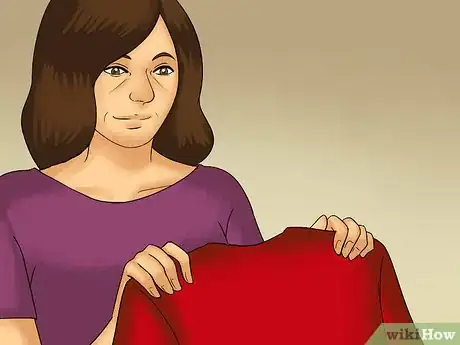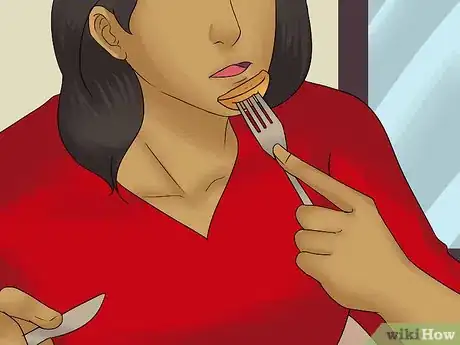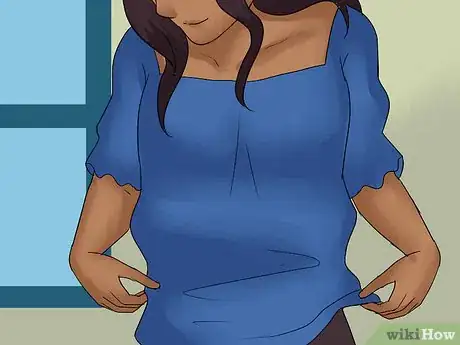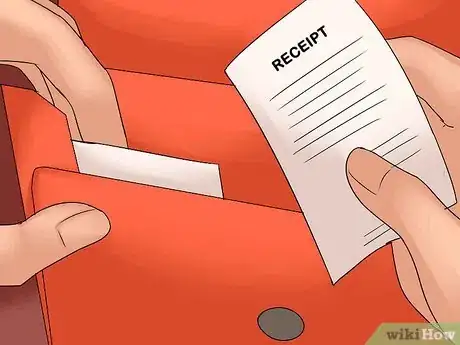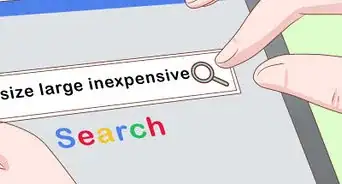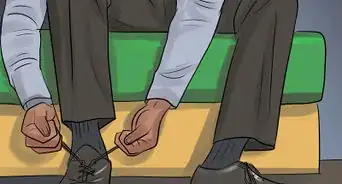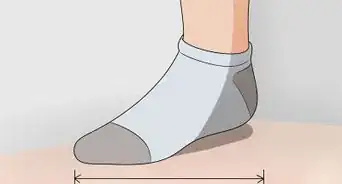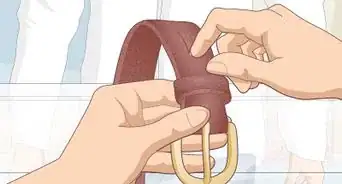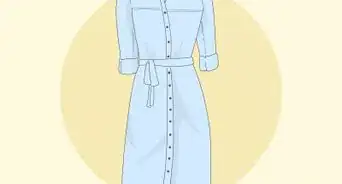This article was co-authored by Susan Kim and by wikiHow staff writer, Sophia Latorre. Susan Kim is the owner of Sum+Style Co., a Seattle-based personal styling company focused on innovative and approachable fashion. She has over 5 years of experience in the fashion industry, and received her AA from the Fashion Institute of Design & Merchandising.
This article has been viewed 72,525 times.
Shopping for a new wardrobe is a fun and rewarding experience, but it can be a bit daunting if you don't know where to start. Thankfully, there are plenty of ways to make your experience easy, stress-free, and affordable.
Steps
Creating a Shopping Strategy
-
1Decide on a budget. You'll want to decide how much you can spend before you go shopping, or you may end up blowing a ton of money. Figure out how much money you can dedicate for new clothes, and be sure to stick to your budget.[1]
- Think about cost per wear. An item isn't a steal if you get it for $50 and only wear it once, but buying a jacket that costs $100 and wearing it for the entire winter is a smart purchase.[2]
-
2Choose which stores you visit based on what you need. You may be looking for something in particular, or you may just need a few everyday items. Consider whether your wardrobe is lacking in a particular area, such as work clothing or athletic wear. Perhaps you need a few new pairs of jeans, a nice suit, or something for a special occasion. Make a list of what you want or need, and stick to it.[3]
- Consider sports stores for athletic wear and outdoor gear; check out department stores such as Nordstrom or Dillards for everyday items as well as fancy garments; or choose a brand-name outlet if you're looking for specific items, such as Levi's when you are in need of jeans.
- You can also look at outfits online to get an idea of what you like. Do an image search or go to a fashion website or even a clothing retailer website. Consider how items are put together to get an idea of what kinds of things you would like to wear.[4]
Advertisement -
3Let your eye guide you. Pick out things that you are automatically drawn to. You want to purchase items that you truly love and that you'll feel great it. Trust your intuition and pick things that you think are fabulous. Don't worry too much about current trends or styles.
- Remember to think about what you will wear with the new item. If you are purchasing separates, be sure you have pants or a skirt that will coordinate with the top, and vice versa. If you are purchasing a dress or suit, consider if you have appropriate shoes and accessories to go with it. You don't want to end up with a bunch of items in your closet that you can't make complete outfits from.
EXPERT TIPCatherine Joubert is a personal stylist who works with a wide range of clients on refining their style. She launched Joubert Styling in 2012 and has since been featured on Buzzfeed and styled celebrities such as Perez Hilton, Angie Everhart, Tony Cavalero, Roy Choi and Kellan Lutz.Professional Stylist
 Catherine Joubert
Catherine Joubert
Professional StylistLook for clothing that flatters your skin tone, especially tops. Personal stylist Catherine Joubert says: "Your skin tone, hair color, and eye color can all affect what colors look good on you, especially the colors you wear near your face. Look online for recommendations of colors that will work with your coloring. Then, when you're shopping, try to find clothes in those colors. It's a great way to help narrow your options when you're looking at clothes."
-
4Be selective. Only buy it if you really love it and are comfortable in it. Don't buy anything you may not want later or that does not fit properly, no matter how much its marked down from the "original retail price." Also, consider if you have similar items; if you have three pea coats, you don't need another one, even if you like the color.
- Check the labels to see how high maintenance the item is, and if you're willing to care for it the way it needs to be so it lasts (i.e. hand wash only, needs ironed after every wash, etc.) If you know you're unlikely to take an item to the dry cleaners, don't purchase it if it's dry clean only.[5]
EXPERT TIPSusan Kim is the owner of Sum+Style Co., a Seattle-based personal styling company focused on innovative and approachable fashion. She has over 5 years of experience in the fashion industry, and received her AA from the Fashion Institute of Design & Merchandising.Professional Stylist
 Susan Kim
Susan Kim
Professional StylistTry to keep your closet curated. Professional stylist Susan Kim recommends: "Look in your closet before you go shopping to make sure you don't purchase a piece that's similar to something you already have. Also, to avoid getting too cluttered, try donating something you don't wear very often any time you buy something new."
Shopping in a Store
-
1Wear comfortable clothes. Wear clothes you feel good in and shoes that can easily slip on and off for shopping. Pay attention to the undergarments you have on; they should be ones you would wear under the clothes you plan to purchase (e.g., wear a strapless bra if you are looking for a strapless dress).
-
2Eat before you go shopping. Otherwise you'll quickly lose energy and may end up purchasing items just so you can be done. Bring a water bottle and a snack if you plan to be shopping for a while, or plan to take a break and have lunch while you're out.
-
3Look through the entire store. You may find several things you like on the first few racks, but that doesn't mean you should call it quits. Browse through different sections to ensure you see everything the store has to offer. You could also start shopping at the back of the store and work your way toward the front.
-
4Ask a salesperson for help. If you're struggling to find the items or size you are looking for, ask a salesperson to help you choose things. Remember to be kind and courteous. They can bring you multiple sizes or similar styles. A salesperson may pair items you hadn't thought of, or bring you something that you hadn't considered before but end up loving.
- Keep in mind that it is their job to sell items, so don't decide to purchase something just because the salesperson says it looks great. Ensure you really like the item and are comfortable with the price before buying.[6]
-
5Inspect the garment. Ensure the item is well-made and the fabric is high-quality. Look carefully to be sure there are no stains, tears, or missing items (buttons, decals, etc.) on the clothes. Check out the seams, zippers, etc. to be sure they are of good quality. If it is hard to fasten or there are lots of threads coming out of the stitching, don't buy it.
-
6Focus on fit. Avoid buying items with puckering seams, uneven hems, unsightly gaps, or other issues. Sit, stand, and stretch while using the mirrors provided in the fitting rooms to check every angle. If the item is too tight or gaps open while sitting, it's not the right item for you. Don't get it if you won't be comfortable while wearing it.
- Only buy items that will fit you now. Don't buy a different size hoping that you'll one day fit into it, or the piece may end up just hanging in your closet.
Shopping Online
-
1Know your size. Sizes can vary by brand, so it's a good idea to take your measurements before shopping online. Many manufacturers have a sizing chart available on the website, so consult this to be sure you're getting the right size before purchasing an item.[7]
-
2Shop around. One of the best things about online shopping is the convenience. It's easy to find multiple sellers for a single item. If you're looking for a specific item or brand, do a web search for that item. You'll get lots of results for the same thing, which makes it easy to compare prices and find the best deal.
-
3Check comments and reviews. Spend some time reading comments and reviews from other customers so you will know what to expect when your package arrives in the mail. Other customers can let you know if an item didn't look or fit as advertised, as well as whether the quality of the item was high or low.
-
4Look at the return policy. Since you can't try on items you find online, make sure the store you are buying from has a good return policy. Ensure you can send the item back if it doesn't fit, and look for free return shipping to cut costs.
-
5Consider the shipping costs. You may find a great deal on an item you love, but if the shipping costs are exorbitant you may end up paying far more than you'd like just to get the item in your hands. Look at the shipping costs for each item and store you want to purchase from. Some stores give discounts on shipping if you spend a certain amount, so consider buying several things from the same place.
-
6Search for coupon codes. Coupons aren't always advertised on the store website. Do a web search for coupons from the manufacturer as well as the supplier. You may be able to find coupons for the specific item as well as the specific store.
-
7Try on items as soon as they are delivered. Some stores have time-sensitive return policies, and you don't want that new dress hanging in your closet for weeks before you realize it's too big. Try things on as soon as you receive them so you know whether to send things back or keep them.[8]
-
8Keep all receipts and packing slips. Make a folder or choose a spot to store all your receipts and packing slips from online shopping. This will make it easier for you to return items if needed, as well as keep track of how much you spend and what stores or sites you frequent.[9]
Expert Q&A
-
QuestionHow often should I go shopping for clothes?
 Paul Julch, MAPaul Julch is a Personal Wardrobe Stylist, Speaker, and the founder of Urbanite | Suburbanite, a wardrobe styling business in the San Francisco Bay Area. With over 25 years in the fashion industry, Paul works with clients to make getting dressed easier, less time consuming, and more enjoyable. Paul has years of experience in retail visual merchandising - styling windows, displays, and floor sets for Banana Republic, Gap, and Express. He also has experience styling fashion photo shoots and corporate videos. Paul holds a BS Degree in Management from State University of New York at Binghamton, an MA in Clinical Psychology from Long Island University. He also studied Interior Design at the University of California, Berkeley.
Paul Julch, MAPaul Julch is a Personal Wardrobe Stylist, Speaker, and the founder of Urbanite | Suburbanite, a wardrobe styling business in the San Francisco Bay Area. With over 25 years in the fashion industry, Paul works with clients to make getting dressed easier, less time consuming, and more enjoyable. Paul has years of experience in retail visual merchandising - styling windows, displays, and floor sets for Banana Republic, Gap, and Express. He also has experience styling fashion photo shoots and corporate videos. Paul holds a BS Degree in Management from State University of New York at Binghamton, an MA in Clinical Psychology from Long Island University. He also studied Interior Design at the University of California, Berkeley.
Personal Wardrobe Stylist & Speaker
-
QuestionHow can I save money?
 Sydneyjane16Community AnswerFind coupons, promotions, sales for holidays, or shop at a thrift store!
Sydneyjane16Community AnswerFind coupons, promotions, sales for holidays, or shop at a thrift store! -
QuestionHow can I be popular with expensive clothes?
 Community AnswerClothes don't make you popular, being the kind of person who others want to be around make you popular. Expensive clothes are no substitute for personality.
Community AnswerClothes don't make you popular, being the kind of person who others want to be around make you popular. Expensive clothes are no substitute for personality.
References
- ↑ http://myyearwithoutclothesshopping.com/top-ten-shopping-tips/
- ↑ http://www.style-makeover-hq.com/clothes-shopping.html
- ↑ http://myyearwithoutclothesshopping.com/top-ten-shopping-tips/
- ↑ http://www.collegefashion.net/shopping/how-to-shop-like-a-pro-the-ultimate-guide-to-shopping-for-clothes/
- ↑ http://www.whowhatwear.com/smart-guide-on-how-to-shop-for-clothes-never-regret-a-purchase-2013/slide12
- ↑ http://myyearwithoutclothesshopping.com/top-ten-shopping-tips/
- ↑ http://www.sizecharter.com/clothing-fit-and-measurement/how-to-measure-your-body-for-clothing-sizes
- ↑ http://www.un-fancy.com/smart-shopping/how-to-shop-for-clothes-online-5-tips-to-simplify-the-process-plus-my-favorite-stores-that-offer-free-shipping/
- ↑ http://www.un-fancy.com/smart-shopping/how-to-shop-for-clothes-online-5-tips-to-simplify-the-process-plus-my-favorite-stores-that-offer-free-shipping/
About This Article
Before shopping for new clothes, make a maximum budget and a list of everything you need. Choose items you love that fit well with clothes you already own, but check the care label and price tag before committing. Look at yourself from every angle so you can spot any stains or tears in the clothing. Focus on how the clothes fit as well as when, where, and what you plan on wearing them with. For advice on comparing prices and getting discounts, scroll down!

